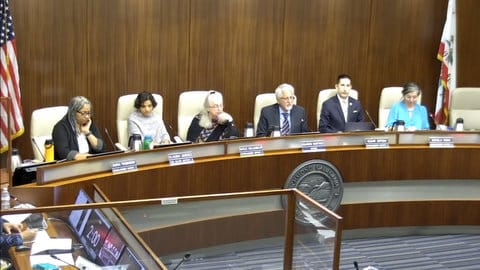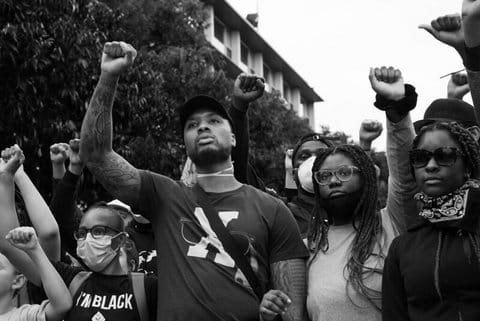
08 Feb City Council Considers Street Maintenance, Gets Virtually Invaded by Hate Group

The Richmond City Council — from left, members Doria Robinson, Claudia Jimenez and Gayle McLaughlin, Mayor Eduardo Martinez, and members Cesar Zepeda and Soheila Bana — on Tuesday was advised on road maintenance and honored former mayor Irma Anderson. (Screenshot captured by Samantha Kennedy / The CC Pulse)
By Samantha Kennedy
The Richmond City Council learned on Tuesday that the average pavement conditions in the city are better than some neighboring cities, but it will need to increase funding just to maintain current conditions.
Current funding for street pavement maintenance is about $4 million per year, which would allow for a gradual decrease in street conditions over the next 10 years. An additional $11 million a year would be needed to maintain current conditions.
But the city has options to manage conditions and funding effectively.
Margot Yapp, president of engineering and environmental firm NCE, said it is just as important to provide maintenance to streets in good condition as it is to streets in poor condition. Doing so maintains overall conditions and can reduce required funding in the future, according to her presentation.
One funding scenario in Yapp’s presentation shows that an $11 million increase per year that would be used to address the worst roads first will begin to see deteriorating road conditions in the coming years. Deferred maintenance funding in this scenario would also exceed that from an equal distribution scenario by almost $100 million.
City staff will use the pavement management software StreetSaver to decide how to best use funding. Yapp said the software typically prioritizes streets in need of preventative maintenance, which are already in decent condition, because it looks to get the best value for their money. Streets that are in fair condition are also likely to be prioritized. Those that are unlikely to be chosen for maintenance, even if they are in the worst condition, are low-traffic roads.
Council member Soheila Bana asked what alternative funding sources could be used to further fund street maintenance. Bana asked if grants were given any consideration and if heavy trucks, which cause more damage to roads than other vehicles, would have any tax imposed on them.
Tawfic Halaby, a deputy director of public works, said the department has a grant writer who works with them to increase outside funding. An impact fee for heavy trucks, according to City Manager Shasa Curl, is something the other public works Deputy Director Robert Armijo will be working on.
Streets that are completely reconstructed are expected to last for 20 years, according to Yapp. With proper maintenance, those streets can last even longer.
Hate Group Reemerges During Black History Month
Several Zoom callers spouted anti-Black language on Tuesday after the council honored former mayor Irma Anderson’s life during Black History Month.
Anderson, the first Black woman to serve as mayor in Richmond, died last month at 93. Her election to the Richmond City Council in 1993 also made her the first Black woman to serve as a council member in the city. Only three Black women have served on the council since.
“We all stand here on her shoulders,” said her son Ahmad Anderson. “She’s paved the way.”
Associates from the neo-Nazi group the Goyim Defense League, who previously called in at the Oct. 3 meeting with antisemitic and anti-LGBTQ+ language, used anti-Black and antisemitic language this time. A member of the group took credit for the Oct. 3 event on a far-right social media site, drawing praise from other members.
These members belong to the City Council Death Squad, a group on that site of over 500 members that call into city councils across the United States with antisemitic, racist and anti-LGBTQ+ hate speech. Some cities that have fallen victim to the group, including El Cerrito, have done away with public comment by Zoom to prevent further hate speech.
The group responded by setting up a fundraiser to help members travel and participate in meetings in person.
Mayor Eduardo Martinez apologized after a speaker used the n-word and asked that speakers be cut off if they were disrespectful.
“I want everyone to know that that is not Richmond,” Martinez said. Some community members attending in person disagreed. He clarified, “Not the Richmond we want.”
Residents also spoke of the importance of the contributions made by many Black residents.
Arto Rintella spoke of Richmond’s Black history, noting that Parchester Village was one of the first neighborhoods in California that allowed Black residents to buy homes.
Richmond’s Crime Prevention Manager Michelle Milam said Anderson’s impact on the community was big. Had it not been for Anderson, Milam said, the Office of Neighborhood Safety and Richmond ferry would not be here.
“More than anything, she was a public servant,” Milam said.
You can learn more about Richmond’s Black history on the city’s website. The city will host a Black History Celebration, which will include music, line dancing and food, at the Richmond Memorial Civic Auditorium on Feb. 24. Tickets, which cost $15, can be bought by calling (510) 620-6793.
The next regular Richmond City Council is on Feb. 20.






No Comments